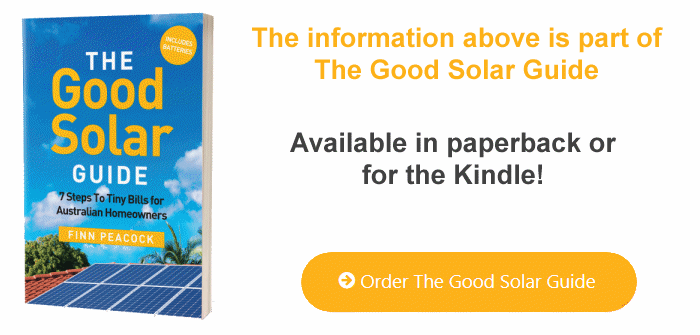Step 1 – Essential Knowledge – The Good Solar Guide
← Using The Book | The Good Solar Guide Contents | Power Vs. Energy →
Imagine buying a new car without knowing the difference between distance and speed. Without knowing that you buy fuel in litres. Without knowing that diesel and petrol and LPG are different fuels. Without understanding the difference between a ute, an SUV, a wagon and a hatchback. Without realising that paying more for a Hyundai than a Ferrari is a really bad deal.
You’d be completely at the mercy of the car salesperson. The sad truth is that many car salespeople are more interested in selling you the car that makes them the biggest commission, or in shifting stock, than in finding the one car that will best serve you for the next few years. And even if you luck out with a salesperson who will scour the earth to find you the right car, they certainly aren’t going to recommend a brand that they don’t sell.
Can you imagine a Holden dealer saying, ‘Actually, the Ford Territory would be a great car for your family – pop over to the Ford dealer and they’ll look after you’?
You should also know what kind of fuel economy it is reasonable to expect. If you just walk from dealer to dealer demanding the most efficient car, you’re unlikely to get the car that suits you. Yet people will often demand the most efficient solar panel – not realising they could be paying a 100% premium for a panel that’s only 5% more efficient.
You also need to know some background to decide what extra features you need and have a good idea of what the whole solar power system package should cost.
When you’re buying a new car, you need a base level of knowledge. This is knowledge that you’ve no doubt picked up already because cars are such a big part of Western culture. However, solar power is such a new industry that you need to learn the basics before buying.
By the time you’ve finished this section, you’ll have a really good feel for the solar energy basics. It’s a good investment of your time because solar power is going to play a big part in the world’s energy future. People who don’t understand the basics will be the ones left complaining while they pay through the nose for grid electricity or struggle with a pile-of-crap PV system on their roof that’s nothing but a huge pain in the backside. Meanwhile, the knowledgeable homeowners, like you, will enjoy clean, safe, cheap, reliable energy from the sun.
Fundamental 1: Solar energy versus solar power
What is the difference between ‘solar energy’ and ‘solar power’? Wait, you thought they were one and the same thing?
Nope. Believe it or not, there’s an important difference between solar power and solar energy. To be more specific, there’s a large and important difference between what constitutes power and what constitutes energy.
There’s a reason I’m starting the book with this weird-sounding question. To specify a solar power or battery system for your home, you absolutely need to understand the difference. If you don’t, you can get into all sorts of trouble.
Let’s go back to the car analogy. Imagine you were buying a car and you didn’t know the difference between speed and distance. Sounds ridiculous, right? You might ask for a car that can go 800 kph between filling up (when you really need a range of 800 km). Or a car that can go from 0 to 60 km in under 5 seconds (when you really mean 0 to 60 kph). Or imagine telling the salesperson that you’ll never drive over 110 km because you stick to the speed limit.
It all sounds ridiculous and it’s a recipe for total confusion. You’d be highly unlikely to get the right car for you if you didn’t know the difference between speed and distance. Yet this situation happens every day in Australia when people are buying solar. And as home batteries go mainstream, it will only get worse. There was a Catalyst special on ABC recently and even they got their power and energy mixed up. God help us.
Read on. In about four minutes, you’ll fully understand the difference between power and energy and thus will know more than the average Catalyst presenter, as well as, I’m sad to say, some solar salespeople.
Here’s the first thing you need to know:
- Power is measured in kilowatts (kW)
- Energy is measured in kilowatt-hours (kWh) Let’s break those terms down:
- k stands for kilo, which means one thousand
- W stands for watt, which is a measure of power
- h stands for hour, a measure of time
← Using The Book | The Good Solar Guide Contents | Power Vs. Energy →
Questions or feedback about the content on this page? Contact me.
